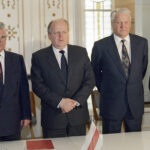WikiLeaks – Armenia No 36
C O N F I D E N T I A L SECTION 01 OF 02 YEREVAN 001494
SUBJECT: LATEST MEETING WITH TURKISH COUNTERPART DISAPPOINTS DFM KIRAKOSSIAN
Classified By: Ambassador John M. Evans for reasons 1.4 (b,d).
——-
SUMMARY
——-
¶1. (C) On August 16, Deputy Foreign Minister Arman Kirakossian told the Ambassador that his recent meeting in Vienna with Turkish Deputy Undersecretary Ahmet Uzumcu was less productive than the GOAM [Government of Armenia] had hoped. According to Kirakossian, the two sides still cannot agree on the structure or scope of the proposed inter-governmental commission on the events of 1914-1915. He said that Uzumcu “repeatedly focused” on the upcoming Kazan meeting between the Armenian and Azerbaijani Presidents and suggested the Turks were “awaiting a breakthrough.” He said the Turks viewed the Kazan meeting as an indicator of how much latitude they could afford in talks with the Armenians regarding border opening and the proposed Turkish-Armenian historical commission. While he emphasized that mid-level bureaucrats from both sides continued to work on the action plan of administrative and people-to-people confidence building measures, Kirakossian expressed his disappointment that Uzumcu was “unwilling” to set the date for their next meeting until after the Kazan summit. End Summary.
——————————-
NEVER AS GOOD AS THE FIRST TIME
——————————-
¶2. (C) Ambassador Evans met with Deputy Foreign Minister Arman Kirakossian August 16 to discuss his recent meeting in Vienna with Turkish MFA Deputy Undersecretary Ahmet Uzumcu. A disappointed Kirakossian said that the July 29 sessions, his second with Uzumcu in the past three months, were “just not as good as the first meeting.” He claimed that the format (4 plus 4) and tone remained positive, but said that substantive issues hampered tangible headway between the two sides. As usual, Kirakossian guarded details of the meeting, but did not hesitate to assert his overall disappointment in the outcome.
—————————————–
DISAGREEMENT ON COMMISSION SLOWS PROGRESS
—————————————–
¶3. (C) Kirakossian cited differences over the goals and scope of the proposed inter-governmental commission on the events of 1915 as the major impediment to progress during the Vienna meeting. After reading the letters of both Presidents on the issue, Kirakossian suggested that the GOAM’s proposal to create five sub-commissions (diplomatic relations, opening the border, academic research, trade and commercial prospects and public opinion/cultural exchange) went too far for the Turks. He said that the Turks “seemed focused on the past, while we want these meetings to talk about the future.” Kirakossian pointed to the timeline and performance measures in the GOAM proposal as evidence of the Armenians’ willingness to make “significant” progress toward normalizing relations. Kirakossian said that Uzumcu made it clear to him, however, that Turkish Foreign Minister Gul was so opposed to the GOAM approach that he reportedly never took the Armenian proposal beyond his Ministry to Prime Minister Erdogan or any others in the GOT. Kirakossian claimed that Uzumcu emphasized to him privately on the margins of the talks that establishment of the commission as prescribed by the Turkish side was an important confidence-building measure for the GOT.
——————————————-
KIRAKOSSIAN SAYS TURKS ARE FOCUSED ON KAZAN
——————————————-
¶4. (C) Kirakossian said that Uzumcu “repeatedly focused” on the upcoming Kazan meeting between the Armenian and Azerbaijani Presidents and suggested the Turks seemed to be “awaiting a breakthrough.” He said the Turks viewed the Kazan meeting as an indicator of how much latitude they could afford in talks with the Armenians regarding border opening and the proposed Turkish-Armenian historical commission.
—————————————
NO MEETING DATE, BUT EXCHANGES CONTINUE
—————————————
¶5. (C) Kirakossian said he was disappointed that Uzumcu was unwilling to set the date for their next meeting until after the Kazan summit. He emphasized, however, that mid-level bureaucrats from both sides continued to work on the action plan of administrative and people-to-people confidence building measures. He would not say if the action plan had changed significantly in recent months, but listed recent cultural exchanges (including Armenian musicians performing in Istanbul) as evidence that these contacts continue to produce results. He said that the MFA was frustrated that the GOT [Government of Turkey] did not consult with the GOAM on the name of a consultant for the restoration of the Akhtamar church complex, but nonetheless said the project was a step in the right direction. Kirakossian ended the discussion of Turkey-Armenia relations with a brief discussion of the proposed Turkey-Georgia-Azerbaijan railway project that would circumvent Armenia. He told the Ambassador that the project was “worrisome” and called it “another example of isolation” for Armenia in the region (septel).
——-
COMMENT
——-
¶6. (C) We believe it is important that the MFA maintain at least the appearance of momentum in talks so that more nationalist forces in the GOAM do not seize on perceived failures of the meetings as proof that opening the border is an impossible goal. Our interpretation of the GOT’s focus on the outcome of Kazan–as reported by Kirakossian–is that Turkey still views its closed border as an essential lever to press Armenia to negotiate with Azerbaijan. Uzumcu’s approach could indicate that, without agreement from Azerbaijan, Turkey will take no significant steps forward. Regardless of the results of the Kazan meeting, we will encourage the Armenians to set a date for the next set of talks and keep pace on their people-to-people projects.
EVANS

![Baku – [Leninakan] Gyumri Plane Crush – December 11, 1988](https://www.aniarc.am/wp-content/uploads/2018/12/Il-76-218x150.jpg)










